Picture this: a bustling college campus, alive with the energy of students poised on the edge of their academic journeys, ready to step into the world beyond. It’s a moment of immense possibility, where aspirations and ambitions intertwine with the practicalities of building a career. As campus recruiters, you are uniquely vital to unlocking these dreams, shaping futures, and bridging the gap between potential and success.
Your role has never been more vital in the fast-evolving landscape of campus recruiting in 2023 and beyond. With each passing year, the expectations of both employers and students are shifting, and the art of campus recruitment has transformed into a dynamic dance of strategy and empathy.
The statistics speak volumes: the Class of 2023 is more digitally connected, socially conscious, and diverse than ever. How will you tap into this evolving tapestry of talent, understanding their unique stories and aspirations?
In this guide, we’ll navigate the nuances of this year’s online recruiting trends, share invaluable insights on crafting a resonating strategy, and unveil the latest tools to amplify your efforts in campus recruiting.
But first, let’s start with the basics.
What is Campus Recruitment?
Campus recruitment refers to the process through which companies visit educational institutions, such as colleges and universities, to identify and hire talented students for full-time positions or internships. It’s like a matchmaking event where employers seek out promising candidates who are nearing the completion of their studies. This provides students a direct avenue to secure job opportunities right out of college, while companies get access to fresh, enthusiastic talent to fuel their workforce. It’s a win-win situation that bridges the gap between academia and the professional world.
Why Campus Recruiting is More Important Than Ever
In today’s rapidly evolving world, campus recruiting isn’t just a trend; it’s a strategic necessity. As industries transform and technologies advance, the demand for fresh, innovative minds is higher.
Here’s why campus recruiting has taken the spotlight:
- Fresh Perspectives: Campuses are like idea incubators, churning out bright minds with innovative ideas and a thirst for knowledge. By tapping into this resource, companies inject their teams with a refreshing dose of creativity and forward-thinking.
- Skill-Specific Matches: Campus recruiting is like matchmaking for skills. Companies can handpick candidates with the necessary skills, tailoring their workforce to tackle modern challenges head-on.
- Digital Natives: Today’s students are practically born with smartphones and can navigate the digital realm like seasoned experts. They bring a natural flair for technology and digital trends that can give businesses a competitive edge in the tech-driven world.
- Cultural Fit: Campus recruiting isn’t just about finding talent but the right fit. Graduates are more likely to align with a company’s values and culture, leading to happier employees and higher retention rates.
- Employee Engagement: Hiring from campuses injects youthful energy into the workforce. Young professionals are highly motivated and eager to make an impact, which can elevate overall employee engagement.
In essence, campus recruitment is the secret sauce that keeps businesses ahead of the curve. By investing in the talent of tomorrow, companies can pave the way for a brighter and more innovative future.
Campus Recruitment Trends and Figures
Understanding the latest campus recruitment trends and figures is essential to grasp the dynamic interplay between educational institutions and the corporate world in the ever-evolving talent acquisition landscape.
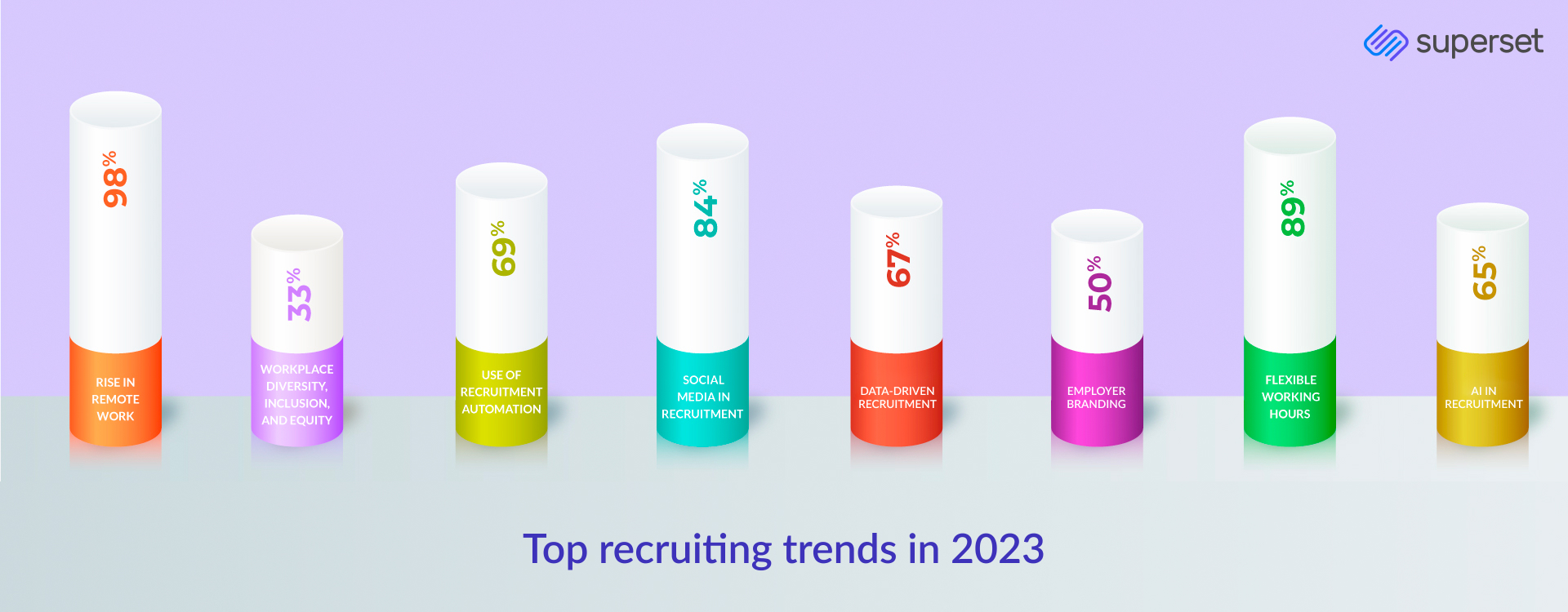
Let’s have a look at it.
- Virtual Recruitment: With the rise of technology and the impact of events like the COVID-19 pandemic, virtual campus recruitment has gained prominence. Companies now conduct online placement drives, virtual job fairs, and interviews using video conferencing tools.
Read here: 10 Strategies for Virtual campus recruitment in 2023 (For Corporates)
- Diversity and Inclusion: Companies focus on diversity and inclusion by actively recruiting from various educational institutions and backgrounds. This promotes a more varied and innovative workforce.
- Data-Driven Decisions: Organizations use data analytics to improve campus recruitment strategies. They analyze the success rate of candidates from different campuses and refine their approach accordingly.
- Skill-Centric Hiring: Instead of just looking at academic achievements, employers emphasize candidates’ practical skills, such as problem-solving, critical thinking, communication, and adaptability.
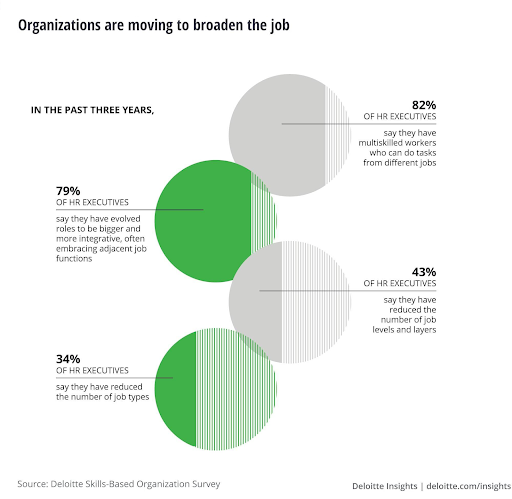
- Internships and Pre-Placement Offers: Many companies offer internships to students before their final placements, which can lead to pre-placement offers (PPOs) based on performance during the internship.
- Remote Work Considerations: With the acceptance of remote work, companies are hiring candidates from various locations, which can widen the scope of campus recruitment beyond geographical constraints.
Who is Involved with Campus Recruiting?
Campus recruiting involves several key stakeholders who play distinct roles in the process. These stakeholders collaborate to facilitate the seamless transition of students from academia to the professional world.
The main parties involved in campus recruiting include:
- Employers and Companies: Organizations seeking to hire entry-level talent to participate in campus recruitment. They offer job opportunities, conduct interviews, and assess potential candidates to identify the best fit for their teams. Employers use campus recruiting as a strategic approach to secure skilled and motivated individuals who can contribute to their growth.
If you’re a recruiter looking for a hassle-free, time-saving way to hire across domains, look no further. Get your hands on a pool of pre-assessed and interview-ready candidates from the best colleges and universities in the country.
Shortlist, Interview, and roll out offers— all within a week!
Don’t believe us; read what our clients say about it.
- Educational Institutions: Colleges, universities, and schools are crucial partners in the campus recruitment process. They provide a platform for employers to interact with students, facilitating job fairs, placement drives, and other events. Educational institutions help prepare students for recruitment by offering career counseling, resume workshops, and interview preparation.
- Students: As the primary beneficiaries, students actively participate in campus recruitment. They attend job fairs, presentations, and interviews to explore career opportunities. Students also submit their resumes, undergo assessments, and participate in interviews to showcase their skills and secure job offers.
- Career Services: Many educational institutions have dedicated career services departments that offer guidance, resources, and support to students seeking campus placement. These departments assist students with resume building, interview techniques, and connecting them with potential employers.
- Alumni Networks: Alumni can also be involved in campus recruiting by sharing their industry insights, providing mentorship, and even offering job referrals. Their experiences in the professional world can offer valuable perspectives to current students.
- Recruitment Teams: Dedicated recruitment teams or human resources departments manage the campus recruiting process within organizations. They coordinate with educational institutions, plan recruitment events, conduct interviews, and make job offers.
- Industry Associations and Professional Organizations: These groups can facilitate connections between employers and educational institutions. They may organize industry-specific events, workshops, and conferences that bring students and potential employers together.
- Technology Platforms: With the rise of virtual recruitment platform, campus recruitment automation software plays a crucial role in facilitating the process. Online job boards, video conferencing tools, applicant tracking systems, and virtual career fairs enable efficient interactions between employers and students, regardless of geographical distances.
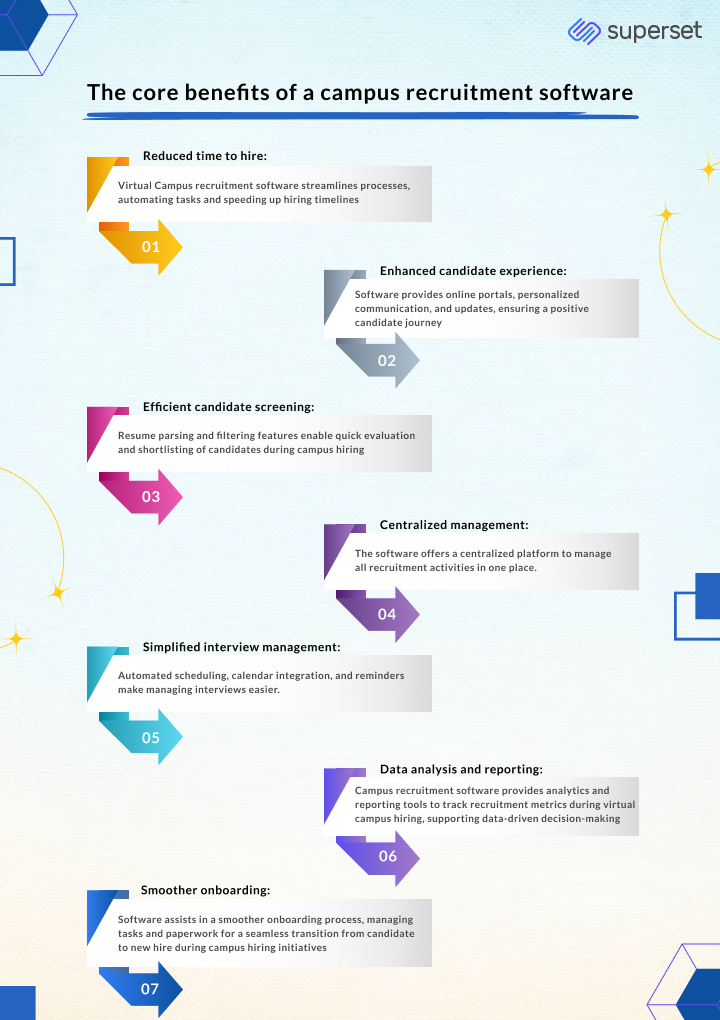
What Does a Campus Recruiter Do?
A campus recruiter is responsible for identifying, attracting, and hiring top talent from educational institutions, such as colleges and universities, to meet the staffing needs of their organization. Campus recruiters are pivotal in bridging the gap between academia and industry by engaging with students and helping them transition into the professional world. Their tasks encompass various stages of the campus recruitment process.
Here’s an overview of what a campus recruiter does:
- Planning and Strategy: Collaborate with hiring managers and teams to understand the organization’s workforce needs and recruitment goals.
- Relationship Building: Cultivate relationships with career services departments and faculty at target educational institutions to facilitate a smooth campus recruitment process.
- Event Coordination: Coordinate logistics for virtual events, including webinars and online job fairs.
- Candidate Sourcing: Review resumes and applications submitted by students and source potential candidates through various channels, including job boards, referrals, and networking.
- Screening and Assessment: Conduct initial screenings of candidates to assess their qualifications, skills, and alignment with the organization’s values. Coordinate and administer written tests, coding assessments, or other skill evaluations.
Also read Online assessment: What is it & How you use it for a better hire
- Interviewing: Conduct in-person or virtual interviews to evaluate candidates’ technical skills, cultural fit, and potential organizational contributions. Coordinate interview schedules with candidates, hiring managers, and interview panels.
- Offer Management: Extend job offers to selected candidates, including negotiating compensation packages and addressing queries.
- Candidate Experience: Provide a positive and informative experience for candidates throughout the campus recruitment process. Address candidate inquiries, provide feedback, and update them on their application status.
- Data Analysis and Reporting: Collect and analyze recruitment data to track the effectiveness of campus recruiting efforts.
- Brand Representation: Represent the organization as an employer of choice by effectively communicating the company’s culture, values, and career growth opportunities.
- Continuous Improvement: Stay updated on industry trends and best practices in campus recruitment to continually enhance recruitment strategies and approaches.
Building a Successful Campus Recruitment Strategy
Building a successful campus recruitment strategy involves a well-thought-out plan that aligns with your organization’s goals and values. A strategic approach ensures that you attract top talent from educational institutions and create a positive experience for both candidates and your team.
Here’s a step-by-step guide to help you develop an effective campus recruitment strategy:
- Define Your Objectives: Clearly outline your recruitment goals. Are you looking to hire interns, entry-level employees, or both? Identify the specific skills, qualities, and attributes you seek in candidates.
- Understand Your Target Audience: Define the universities, colleges, and educational programs that align with your industry and hiring needs. Research the academic calendar to schedule recruitment events during peak student engagement periods.
- Develop Your Employer Brand: Define your company’s values, culture, and unique selling points that will resonate with potential candidates. Craft compelling employer branding messages that communicate why candidates should choose your organization.
- Establish Relationships: Partner with target institutions’ career services departments, faculty, and student organizations.
- Plan Recruitment Events: Organize on-campus or virtual events, such as career fairs, workshops, info sessions, and hackathons. Create engaging presentations highlighting your company’s mission, culture, and opportunities.
- Leverage Technology: Use campus recruitment software for virtual campus interviews and online assessments. Develop a user-friendly and mobile-responsive career portal for applications and information.
- Engage with Students: Offer internships, co-op programs, or project-based collaborations to give students a taste of your organization.
- Tailor Your Messaging: Customize your communication for different stages of the campus recruitment process and various student segments. Emphasize career growth opportunities, mentorship, and skill development.
- Implement a Fair Selection Process: Design a standardized interview process that assesses candidates fairly and consistently.
- Offer Competitive Packages: Research and offer competitive compensation and benefits that appeal to entry-level candidates. Highlight unique perks, such as flexible work arrangements or professional development programs.
- Enhance Candidate Experience: Ensure transparent communication throughout the process, providing timely updates on application statuses. Gather feedback from candidates to continuously improve your recruitment process.
- Measure and Analyze: Track critical metrics, including application-to-hire ratios, time-to-fill, and candidate satisfaction. Use data insights to refine your strategy and optimize your efforts.
- Embrace Diversity and Inclusion: Develop strategies to attract candidates from diverse backgrounds and promote an inclusive environment.
- Continuous Improvement: Regularly assess your strategy’s effectiveness and adapt to changing trends and student preferences. Stay updated on industry best practices and incorporate new technologies.
How Do Employers Campus Recruit?
These are some critical methods employers use to conduct campus recruitment.
Let’s delve a bit deeper into each of these strategies:
- On-Campus Visits: Companies visit campuses to engage directly with students and build a presence.
Presentations: Deliver talks about your company’s values, culture, career opportunities, and industry insights.
Workshops: Conduct workshops or seminars to showcase specific skills, technologies, or projects related to your industry.
Interviews: Schedule on-campus interviews for pre-screened candidates, providing them with a chance to interact with your team. - Virtual Platforms:
a) Leverage video conferencing tools for virtual presentations, workshops, and interviews.
b) Administer skill tests, coding challenges, and other assessments through virtual campus recruiting software.
c) Host webinars to showcase your company’s work and connect with students globally. - Job Fairs and Events:
Participate in campus-wide or industry-specific job fairs to meet a diverse pool of potential candidates. - Internship Programs:
a) Offer internships that provide students with hands-on experience in your company.
b) Convert successful interns into full-time employees by extending pre-placement offers. - Branding and Promotions:
a) Use social media and online platforms to showcase your company’s work, culture, and employee stories.
b) Develop engaging content that resonates with students, such as videos and blog posts. - Campus Ambassador Programs:
Appoint student ambassadors to promote your company and opportunities within their peer networks.
Why Are Employers Adopting Automated Platforms for Campus Recruiting?
Employers are increasingly adopting automated solutions for campus recruiting due to the numerous advantages and benefits these technologies offer. Campus recruitment systems streamline the recruitment process, enhance the candidate experience, and provide more flexibility in engaging with students from various locations.
Superset is gaining considerable traction in automated recruitment platforms, and here’s the compelling reason behind its impact.
- Wider Reach:
a) Superset allow employers to connect with students from different geographical locations, expanding their reach beyond the campuses they physically visit.
b) Virtual platforms enable engagement with a diverse pool of candidates who may not be able to attend in-person events. - Efficient Process:
a) Superset automates various stages of the recruitment process, such as resume screening, scheduling interviews, and sending out notifications.
b) Online assessment platforms accelerate the evaluation of candidates’ skills and qualifications. - Time and Cost Savings:
Virtual recruiting eliminates the need for travel, reducing associated transportation, accommodation, and event logistics costs. - Flexibility:
a) Candidates can participate in virtual events and interviews from their locations, providing greater flexibility and convenience.
b) Employers can conduct interviews across different time zones without logistical challenges. - Data Analytics:
a) Superset provides valuable data and insights into candidate behavior, engagement levels, and the effectiveness of recruitment strategies.
b) Data-driven insights help recruiters make informed decisions and optimize their approach. - Environmental Considerations:
Embracing digital solutions aligns with sustainable practices by reducing the carbon footprint associated with travel and physical materials. - Adaptation to Technological Trends:
The job market is evolving, and students are increasingly tech-savvy. Adopting a campus recruitment system demonstrates an organization’s ability to embrace current trends and technological advancements. - Remote Work Acceptance:
As remote work becomes more accepted, virtual campus recruitment software aligns with the changing nature of work and reflects an organization’s willingness to adapt to new work paradigms.
Pitfalls to Avoid When Campus Recruiting
While campus recruiting can yield many benefits, there are also potential pitfalls that employers should be aware of and actively work to avoid. These pitfalls can hinder the effectiveness of your recruitment efforts and impact the overall candidate experience.
Here are some common pitfalls to steer clear of:
- Lack of Clear Strategy: Establishing a clear and well-defined campus recruitment strategy can lead to organized efforts and consistent messaging.
- Overlooking Diversity and Inclusion: Neglecting diversity and inclusion efforts can result in a homogenous workforce and missing out on a valuable talent pool.
- Poor Brand Representation: Presenting an accurate or attractive picture of your company’s culture and values can encourage potential candidates to apply.
- Inadequate Planning: Poorly planned events, such as disorganized career fairs or rushed interviews, can negatively affect your company’s professionalism.
- Overlooking Small or Niche campuses: Focusing solely on well-known institutions might cause you to miss out on potential talent from smaller or specialized schools.
- Poor Candidate Experience: Cumbersome application processes, unresponsive communication, and lengthy hiring decisions can leave candidates with a negative impression.
- Ignoring Feedback: Refraining from considering feedback from candidates, campus organizers, or your recruitment team can prevent you from making necessary improvements.
- Lack of Adaptation to Virtual Recruitment: In the age of virtual events, not adapting to online recruiting platforms can limit your reach and engagement with candidates.
- Ignoring Soft Skills: Overemphasizing technical skills while overlooking critical soft skills like teamwork and communication can lead to cultural mismatches.
- Rushed Hiring Decisions: Feeling pressured to hire quickly can lead to decisions not aligned with your company’s needs and culture.
- Not Adapting to Changing Trends: Failing to embrace new technologies and recruitment trends can make your approach outdated and less appealing to tech-savvy students.
How to Choose the Perfect Tool for Campus Recruitment
Choosing the perfect tool for campus recruitment involves careful consideration of your organization’s needs, goals, and the features offered by various tools.
Here’s a step-by-step guide to help you make an informed decision:
- Define Your Requirements: List the specific functionalities you need for campus recruitment. Consider features like virtual event hosting, online assessments, candidate communication, data analytics, and integration with your existing systems.
- Research Available Options: Research different tools available in the market. Look for tools specifically designed for campus recruitment or functionalities relevant to your needs.
- Assess Compatibility: Ensure the tool aligns with your organization’s size, industry, and recruitment strategies. Verify if the tool can cater to both in-person and virtual campus recruitment needs, considering the evolving trends.
- Features and Functionality: Evaluate the tool’s features, such as virtual event capabilities, video interviewing, assessment customization, scheduling, and candidate database management.
- User-Friendly Interface: A tool should have an intuitive and user-friendly interface that is easy for recruiters and candidates to navigate.
- Integration Capability: Check if the tool can integrate with your organization’s HR systems, applicant tracking systems (ATS), and other software.
- Customization Options: Determine if the tool allows you to customize the campus recruitment process to match your organization’s branding and specific requirements.
- Data Security and Privacy: Security is crucial when handling candidate data. Ensure the tool complies with data protection regulations and has robust security measures.
- Scalability: Consider whether the tool can accommodate your future growth and increase recruitment needs.
- Vendor Reputation and Support: Research the tool’s vendor or provider. Read reviews, ask for references, and ensure they offer reliable customer support.
- User Experience: Test the tool yourself or have your recruitment team test it to gauge user experience and ease of use.
- Cost and ROI: Evaluate the tool’s cost concerning its benefits. Consider saved time, improved candidate experience, and better recruitment outcomes.
- Training and Onboarding: Check if the tool offers training resources, webinars, or customer support to help your team get accustomed to its features.
- Future-Proofing: Consider whether the tool can adapt to evolving technology trends and changes in recruitment practices.
- Trial Period: Use trial periods to test the tool’s functionalities and assess if it meets your needs.
- Consult Stakeholders: Involve your recruitment team, IT department, and other relevant stakeholders in the decision-making process to gather different perspectives.
- Request Demos and Ask Questions: Arrange demos with tool providers to get a firsthand look at how the tool works. Ask questions about its capabilities, support, and customization options
How to Effectively Utilize Campus Recruitment Tools and Their Features
Effectively utilizing the campus recruitment system and its features requires a strategic approach to streamline recruitment efforts, enhance candidate engagement, and optimize the overall process.
Here’s how you can make the most of these tools:
- Understand the Tool: Thoroughly learn how it works, including its various features and functionalities. Attend training sessions provided by the tool’s vendor to maximize your understanding.
- Align with Recruitment Goals: Identify which tool features align with your campus recruitment goals and strategies. Customize the tool’s settings to match your organization’s branding and specific needs.
- Optimize Candidate Experience: The tool creates an intuitive and user-friendly application process. Enable candidates to easily upload resumes, cover letters, and other necessary documents.
- Virtual Event Hosting: If the tool offers virtual event capabilities, it hosts webinars, online career fairs, workshops, and information sessions. Leverage features like video conferencing, chat rooms, and Q&A sessions to engage with candidates in real-time.
- Online Assessments: Customize assessment tools to evaluate candidates’ technical skills, problem-solving abilities, and other relevant qualifications. Leverage pre-built assessment templates or create your own based on your hiring criteria.
- Interview Management: Utilize the tool to schedule and manage interviews, whether in-person, virtually, or through prerecorded videos. Integrate the tool with your team’s calendar to avoid scheduling conflicts.
- Candidate Relationship Management: Use the tool to maintain a database of candidate profiles and interactions. Send personalized communication to candidates, keeping them informed about their application status.
- Data Analytics: Regularly analyze the data and insights provided by the tool to assess the effectiveness of your campus recruitment campaigns. Identify areas for improvement and optimize your strategy based on data-driven decisions.
- Integration with Existing Systems: Ensure the tool integrates seamlessly with your existing applicant tracking system (ATS) and HR software. Avoid duplicate data entry by automating data synchronization between systems.
- Mobile Accessibility: If the tool offers a mobile app or mobile-responsive features, encourage candidates to use it for easy access to information and updates.
- Candidate Feedback: Collect candidate feedback about their experience with the tool and the recruitment process. Use this feedback to make improvements and enhance the candidate’s journey.
- Communication Automation: Set up automated email notifications to inform candidates about their application progress, interview schedules, and other updates.
- Collaboration and Communication: Use collaboration features within the tool to streamline communication among your campus recruitment team. Keep everyone on the same page by sharing candidate profiles, interview feedback, and assessments.
- Regular Training and Updates: Stay updated on any new features or updates on the tool’s vendor releases. Train your recruitment team on how to use these new features effectively.
- Monitor and Adjust: Continuously monitor your recruitment process’s performance using the tool’s analytics. Make adjustments based on insights to optimize your strategy and achieve better results.
How to Engage a New Generation of Students
Engaging a new generation of students, often Generation Z or Gen Z, requires understanding their unique characteristics, preferences, and values. This generation has grown up in a digital age and has distinct expectations regarding communication, education, and career opportunities.
Here are some strategies to effectively engage and connect with this new generation:
- Embrace Digital Communication: Utilize social media platforms, messaging apps, and other digital channels to reach Gen Z where they spend most of their time. Create engaging and visually appealing content that resonates with their online habits.
The algorithm for every platform is different. For example,
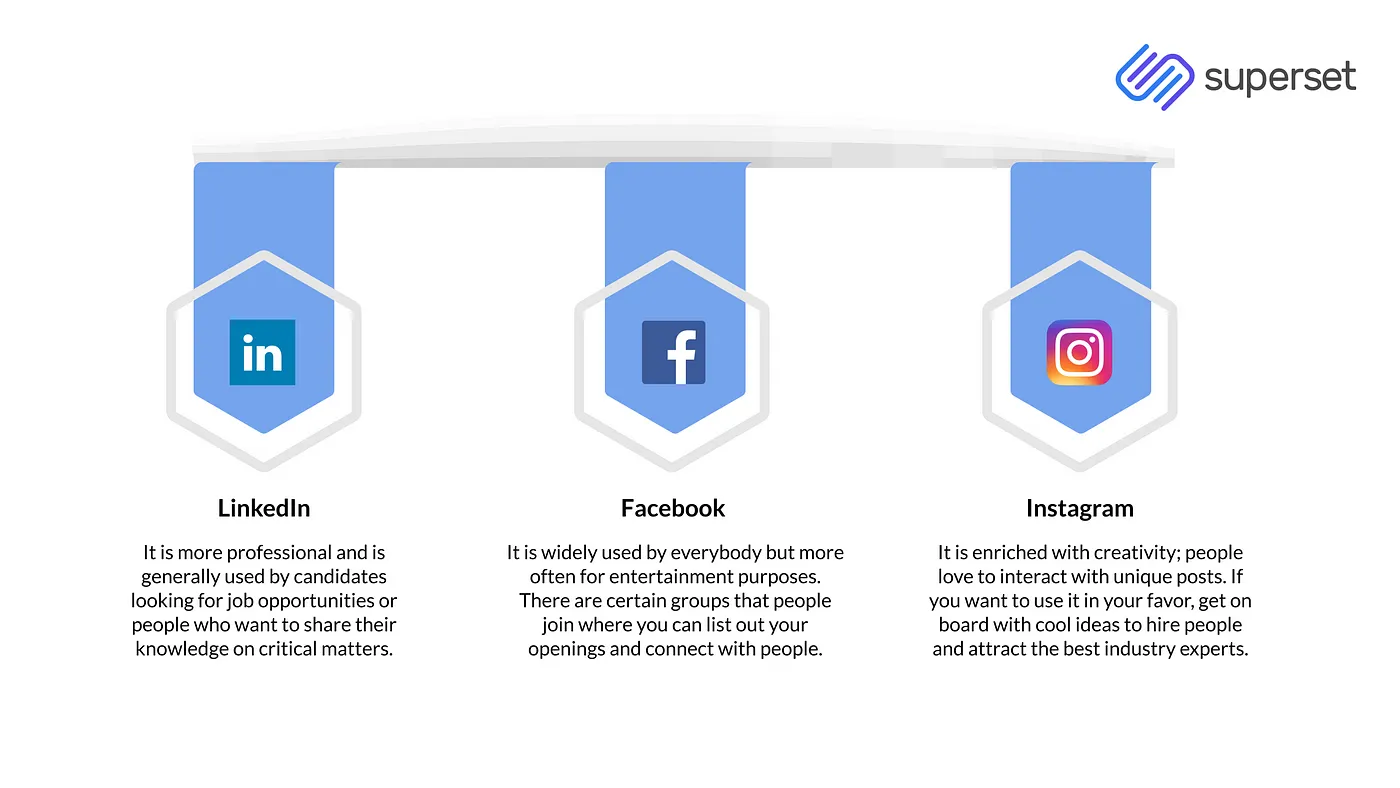
- Leverage Video Content: Gen Z has a strong preference for video content. Consider using platforms like YouTube, Instagram, and LinkedIn to share videos about your company culture, job roles, and industry insights.
- Personalization: Tailor your messaging and communication to each individual’s interests and preferences.
- Authenticity is Key: Gen Z values authenticity and transparency. Be genuine in your communication and avoid overly polished or scripted content.
- Highlight Social Impact: Showcase your company’s commitment to social and environmental causes. Gen Z is passionate about making a positive impact on the world.
- Interactive Experiences: Create interactive online experiences, such as virtual tours of your workplace, interactive webinars, and online challenges.
- Mobile-First Approach: Ensure your digital content and platforms are mobile-responsive, as Gen Z heavily uses smartphones.
- Quick and Snackable Content: Gen Z’s attention span is short. Use concise and easily digestible content, such as short videos, infographics, and bite-sized articles.
- Provide Value: Offer informative content, career advice, industry insights, or skill-building tips.
- Gamification: Gamify aspects of your campus recruitment process or engagement efforts. Gen Z responds well to challenges, competitions, and rewards.
- Diversity and Inclusion: Showcase your commitment to diversity and inclusion. Gen Z values workplaces that embrace different perspectives.
- Professional Development: Highlight opportunities for skill development, mentorship, and career growth within your organization.
- Listen and Respond: Actively engage with Gen Z’s feedback and concerns. Show that you’re receptive to their input.
- Offer Flexibility: Given their desire for work-life balance, emphasize any flexible work arrangements or remote work options your company provides.
- Positive Candidate Experience: Ensure a seamless and user-friendly application process, and provide regular updates on application status.
Campus Recruitment Metrics and ROI
When assessing the success of your campus recruitment efforts and calculating return on investment (ROI), it’s essential to track a range of metrics that provide insights into various stages of the campus recruitment process. These metrics help you understand the effectiveness of your strategy, identify areas for improvement, and measure the value your efforts bring to the organization.
Here are some key metrics to consider:
- Application Metrics
a) Total Applications: The number of applications received for your campus job openings.
b) Quality of Applications: Measure the alignment of applicants’ qualifications with your job requirements.
c) Application Source: Determine where applicants come from, such as career fairs, online job boards, or referrals. - Conversion Metrics
a) Application-to-Interview Conversion Rate: The percentage of applicants who are selected for interviews.
b) Interview-to-Offer Conversion Rate: The percentage of interviewed candidates who receive job offers.
c) Offer Acceptance Rate: The percentage of candidates who accept extended job offers. - Time-to-Fill Metrics: The average time it takes to fill a campus recruitment position, from posting the job to extending an offer.
- Cost Metrics
a) Cost per Hire: The total recruitment costs are divided by the number of hires.
b) Cost per Application: Total recruitment costs divided by the number of applications received.
c) Cost per Offer: Total recruitment costs divided by the number of job offers extended. - Diversity and Inclusion Metrics
a) Diversity of Applicants: Measure the diversity of your applicant pool in terms of gender, ethnicity, and other factors.
b) Diversity of Hires: Assess the diversity of candidates joining your organization. - Candidate Experience Metrics: Gather feedback from candidates about their experience during recruitment.
- Employer Branding Metrics
a) Brand Awareness: Assess students’ awareness and familiarity with your company.
b) Engagement with Brand Content: Monitor social media posts, videos, and other brand content engagement rates. - Return on Investment (ROI) Metrics
a) Hiring Cost ROI: Compare the value of the hires made through campus recruitment against the cost of recruitment efforts.
b) Revenue Impact: Calculate the revenue generated by hires made through campus recruiting efforts. - Long-Term Performance Metrics
a) Employee Performance: Measure the performance of hires made through campus recruitment over time.
b) Retention Rate: Track how many campus hires remain with the company after a certain period. - Benchmarking Metrics: Compare your metrics to industry benchmarks and past performance to understand how your efforts stack up.
- Event Engagement Metrics: For virtual events, track metrics like attendance, engagement rates, and interaction levels during webinars and virtual booths.
In addition, Superset Launchpad is a game changer of job portals that give you access to a vast off-campus pool of talented and driven candidates in the 0-3yr range for any tech or non-tech profile.
Here’s why our job portal is the game-changer you’ve been waiting for:
- Pre-Assessed Pool of Talent (60k Candidates)
- Cost-Effective Solution
- 10x Faster Closures
- Enhanced Candidate Experience
Don’t let outdated hiring practices slow you down.
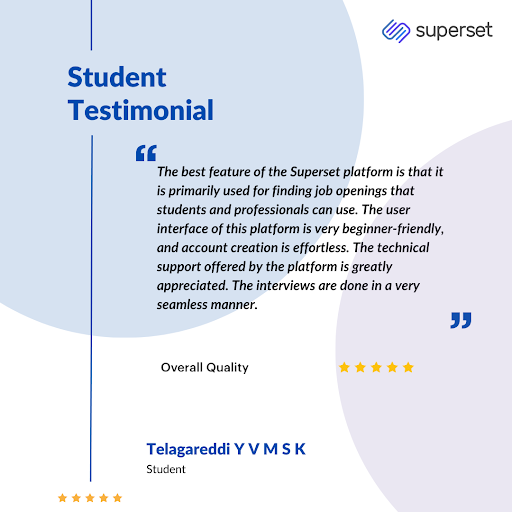
Conclusion
As recruiters and HR professionals, you hold the threads that weave dreams into reality. Your role in campus recruitment is not merely about hiring but about nurturing potential, igniting aspirations, and sculpting the workforce of tomorrow. In the dynamic landscape of 2023, you’re shaping careers and the future itself.
Embrace technology, yes, but always keep sight of the human touch. Behind every resume is a person seeking an opportunity to shine. So, let your interactions reflect respect, encouragement, and the belief that every student has the potential to flourish.
As you dive into campus recruitment, here’s to making a difference, one candidate at a time.
Frequently Asked Questions
What is campus recruitment system?
Campus recruiting software is a tool recruiters can use to simplify the campus recruiting process. The company chooses campus recruitment every year to attract young and new talents to various positions in the company. Campus recruiting software makes the process easier and paves the way for easy hiring.
Why do companies go for campus recruitment?
Acquiring new skills and knowledge: When recruiting through universities, it is easier to select people with a high level of enthusiasm and confidence. For the same reason, campus recruitment is considered one of the best methods of attracting new talents, which makes it easy for businesses to face stiff competition.
What are the steps in campus recruitment process?
- Pre-Placement Talk
Before the formal campus recruitment process begins, companies often conduct pre-placement talks (PPTs). These presentations provide students with insights into the company's culture, values, work environment, job roles, and opportunities for growth. It's a chance for students to learn about the company's expectations and offerings. - Educational Qualification
Companies review candidates' educational backgrounds and academic achievements. Depending on the role, they might have specific academic requirements or preferred disciplines. Strong academic performance can often serve as a first filter for shortlisting candidates. - Written Test
Many campus recruitment processes involve written tests or aptitude assessments. These tests evaluate candidates' logical reasoning, quantitative skills, verbal abilities, and technical knowledge. The test results help companies assess candidates' problem-solving abilities and suitability for various roles. - Group Discussion (Optional)
Some companies conduct group discussions as a way to assess candidates' communication skills, teamwork, leadership potential, and their ability to articulate their opinions in a group setting. During this stage, candidates discuss a given topic or case study. - Technical Interview
Technical interviews are aimed at assessing candidates' domain-specific knowledge, technical skills, and problem-solving abilities. For technical roles, candidates might be asked to solve coding problems, answer technical questions, and explain their approach to various challenges. - HR Interview
The HR interview is a crucial step where candidates' interpersonal skills, attitude, cultural fit, and alignment with the company's values are evaluated. HR interviews also provide candidates with an opportunity to learn more about the company's work culture, expectations, and benefits. - Post-Placement Talk
Once candidates are selected, some companies conduct post-placement talks to provide detailed information about the offer, compensation, benefits, and other relevant details. This is the stage where candidates can seek clarification on any doubts they have before accepting the offer.
What type of recruitment is campus selection?
Campus recruiting refers to external recruiting sources where educational institutions such as colleges and universities offer recruiting opportunities to students. During the process, organizations visit technical, managerial and professional institutions to directly recruit students for new positions.
How does campus recruitment work?
Campus recruitment encompasses the practice of companies visiting educational institutions with the purpose of delivering presentations, organizing workshops, and conducting interviews. These activities are aimed at evaluating and handpicking appropriate candidates from the pool of students.
Why do companies prefer campus recruitment?
Campus recruitment provides companies with the opportunity to access a new and untapped source of talent. This enables them to discover and cultivate young individuals who share alignment with their organizational objectives.
What are the benefits of participating in campus recruitment?
Participating in campus recruitment offers students the chance to connect with potential employers, expand their professional network, and potentially secure enticing job offers prior to completing their studies.
When does campus recruitment usually take place?
The usual timing for campus recruitment is in the last year of students' academic programs, although the specific recruitment season can differ from one institution to another.
How can I prepare for campus recruitment?
In readiness for campus recruitment, direct your efforts towards enhancing your resume, conducting thorough research on companies, honing your interview skills, and cultivating a well-defined comprehension of your career objectives.
What is a pre-placement talk (PPT) in campus recruitment?
A pre-placement talk is a presentation organized by a company prior to the commencement of the recruitment process. Its purpose is to offer students valuable insights into the company's culture, working environment, and various job roles available.
What is the selection process in campus recruitment?
The selection process typically encompasses a range of stages, such as initial resume screening, aptitude tests, group discussions, technical interviews, and final HR interviews.
How important is a strong online presence for campus recruitment?
In the current digital era, cultivating a polished online presence, including a well-maintained LinkedIn profile, can significantly enhance your prospects throughout the campus recruitment process.
What should I wear for a campus recruitment interview?
Dressing in professional attire, such as formal clothing, shows that you take the interview seriously and are committed to making a positive impression.
Is it necessary to have prior work experience for campus recruitment?
While prior work experience can be beneficial, many campus recruitment opportunities are designed for entry-level positions, so lack of experience may not be a major barrier.
How do I stand out during a campus recruitment drive?
To stand out, showcase your unique skills, experiences, and enthusiasm for the company. Research the company thoroughly and tailor your responses accordingly.
Can international students participate in campus recruitment?
Yes, many companies are open to hiring international students. However, it's important to understand the company's policies regarding work permits and visa requirements.
What if I receive multiple job offers from campus recruitment?
Congratulations! Take the time to evaluate each offer based on factors like job role, company culture, growth prospects, and location before making a decision.
What happens after I get selected during campus recruitment?
After selection, you'll receive an offer letter outlining the terms of employment. Review it carefully and communicate your acceptance according to the company's instructions.








